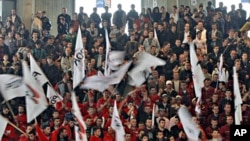Kosovar voters are going to the polls Sunday in the first parliamentary elections since Kosovo declared independence from neighboring Serbia in 2008. The vote will be closely watched by the European Union amid concerns about possible vote rigging and tensions with Serbian leaders.
Kosovo's Prime Minister Hashim Thaci was forced to call the early parliamentary vote after his coalition collapsed last month.
The main contenders for the next government remain Mr. Thaci's Democratic Party of Kosovo and its former junior coalition partner, Democratic League of Kosovo, or LDK.
Opinion polls show he faces a tough battle to keep his job amid public anger over economic difficulties and financial wrongdoing.
Nearly half of the population is unemployed and researchers say most Kosovars complain that corruption increased under Prime Minister Thaci.
The European Union's Special Representative in Kosovo, Pieter Feith, suggests that the upcoming elections are also overshadowed by political and ethnic tensions. Feith says he regrets that politicians representing Kosovo's ethnic Albanian majority have already warned of possible election fraud.
"There should be no vote rigging," Feith said. "But neither should there be statements by the political leaders of the Kosovo Albanian community in particular who are predicting fraud already before anything has happened. That is creating a self fulfilling prophecy a bad atmosphere, suspicions and may turn us in the wrong direction."
EU Representative Feith also criticizes leaders of Kosovo's Serbian minority for urging Serbian voters to boycott Sunday's ballot.
And in an incident of violence, a local Bosnian Muslim leader involved in organizing Sunday's vote was shot dead this week in a mainly Serbian town. It was not immediately clear who was responsible for the shooting.
Most Serbs still view Kosovo as part of neighboring Serbia, despite its independence declaration in 2008.
Additionally, Feith disagrees with statements by Serbian President Boris Tadic who seemed to question the legitimacy of Kosovo's parliamentary elections at a recent summit of the Organization for Security and Cooperation in Europe, or OSCE.
The EU envoy accuses Mr. Tadic of not respecting the will of voters and threatening that Serbia will walk out of scheduled talks with Kosovo's leadership in the capital Pristina.
"The statement by President Tadic at the OSCE summit saying that any change of the realities on the ground would mean the end of the dialogue with Pristina is a bIt surprising," Feith added. "Because I think that the realities on the ground are driven by the citizens and not by the governments."
Analysts say Belgrade faces a difficult balancing act in trying to help its ethnic kin in Kosovo and staying on the path of European Union membership.
More than half of Kosovo's Serb population left Kosovo in 1999, when the North Atlantic Treaty Organization bombed Serbia to halt a military crackdown on independence seeking ethnic Albanians.
Yet, Serbian participation in Kosovo's future government is viewed as crucial to easing ethnic tensions and helping the region move forward towards closer ties with the EU.
Officials say just over 1.5 million people are eligible to vote for more than two dozen political parties, coalitions and groups which will be trying to win election to Kosovo's 120-seat parliament. Ten of those seats are reserved for minority Serbs.
Tensions Overshadow Kosovo's First Parliamentary Poll
- By Stefan Bos




